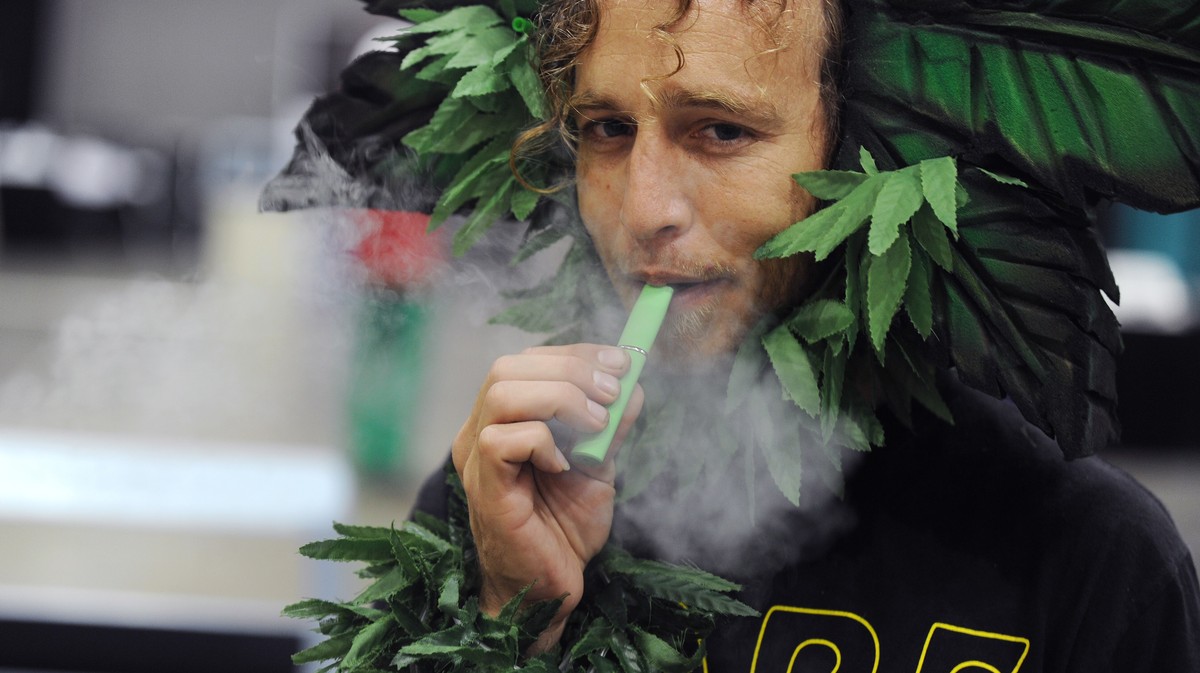
The nascent legal cannabis industry in America appears to be narrowly dodging a bullet.
Regulators and elected officials are freaking out about vape-related illnesses and deaths nationwide. According to the Centers for Disease Control, at least 1,299 cases of lung injury or illness, along with 26 deaths, have been linked to vaping in recent months. Many of those have been tied to THC vaping, especially with black-market vapes, and powerful people have taken to calling for a total ban on all vape products in a fit of what critics called classic Drug War hysteria.
So far, though, Massachusetts has been the only state to implement a ban on all nicotine and cannabis vaping products (albeit a temporary one). Meanwhile, a handful of other states— including Washington, Oregon, and Colorado, where cannabis is legal—have moved to restrict or newly regulate vape sales, including flavored products, even as cannabis has generally remained untouched or at least not severely impacted.
For now, many in the weed industry are pleased. In fact, conversations with legal cannabis insiders suggest they are likely to survive what might have been the most significant threat to their existence since the „War on Pot” of the Obama administration.
„A huge sense of relief,” is how Ian Van Veen Shaughnessy described hearing the news in Oregon. Co-founder of the company that makes Quill vape pens, which he said use only cannabis extract, Shaughnessy’s business isn’t likely to be seriously inhibited by the flavor ban, he said. If Oregon had followed initial recommendations for an outright ban, though, „that would have had massive effects all across the industry, all the way down to the price of flower, because flower growers rely on the ability to sell trim extraction.”
„That would have been disastrous for not just vaporizer companies, but the entire industry,” he said.
„I was definitely worried after I saw the Massachusetts ban happen,” added Jeff Wilhoit from Puffin Farm in Washington, which both grows cannabis and makes cannabis products. A ban like that „would have been a huge blow” to his company, but the more limited approach regulators took in Washington has allowed them to largely do business as usual, he said.
Vaping products make up a huge share of business for some dispensaries. For example, Kye Baker, general manager at Top Shelf Budz in Oregon, estimated that „close to 40 percent” of his business was vape products, but that flavored vaping products were only a small share of that.
Even players whose businesses were likely to be seriously impacted said things could have been worse. Joe Bergen is general manager of Avitas, and his brands make flavored and unflavored vape cartridges in Oregon and Washington. He said the two bans will hit roughly half their cartridge sales. „We have lots of products that we are no longer able to sell,” he said. „We have lots of packaging on hand as we can’t use pipeline anymore. And we’ve had to downsize our operations.” The ban will mean revenue losses and, importantly, job losses, Bergen said, but he still called the move „reasonable and understandable.”
„We’re supportive of regulatory agencies doing what they need to do to protect the legalization of the cannabis industry overall,” he explained.
While a flavor ban is likely to cause real pain for some companies and workers—and vape store owners have taken to suing in some states—the legal weed arm of the industry as a whole appears to have time to adjust to vape backlash. A full ban might have sent a financial shockwave through weed farms in the Pacific Northwest, especially right now as outdoor growers are bringing in their large annual harvest during „Croptober.” After all, growers have also come to expect being able to sell their trim and lower quality flower to extractors, which fuel vapes, to make ends meet, since in Oregon extractors have been steadily buying up more harvest.
A spokesperson at the Washington State Liquor and Cannabis Board told VICE vaping made up about at least 12 percent of the state’s retail cannabis market, but only about a quarter of that was flavored. Another spokesperson for the Oregon Liquor Control Commission (which regulates weed in the state) explained that they don’t track vaping products as a singular category, but they make up a large share of the „extract” category, which is roughly 30 percent of the overall market. Oregon officials estimated only about 10 percent of vape products would be impacted by the ban.
Some vape manufacturers argued the flavor ban was ultimately the smarter public health decision—and not just good for their bottom line—since a total ban could send people to the bootleg market, which, again, the CDC suggests is a major factor in the surge of lung illness and deaths. While there are plenty of theories about the causes of the lung injuries, ranging from vitamin E to certain toxic metals, state and federal officials don’t yet know what the issue is. The relief the industry feels right now could only be temporary if answers don’t emerge soon and deaths continue.
Still, the same arguments that helped justify legalization in the first place appeared to be helping prevent its complete undoing. Or as Bergen put it, „Banning something doesn’t evaporate the demand—the demand still exists.”
Sign up for our newsletter to get the best of VICE delivered to your inbox daily.
Follow Jon Walker on Twitter.